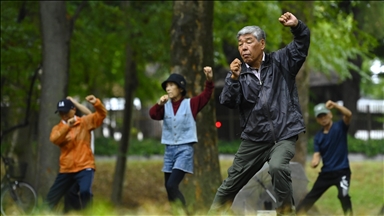Countries with aging populations implement varied social security measures
Japan boasts world’s oldest population, Hong Kong projected to top global ranking by 2050, while Italy, currently 3rd, to remain in top 10
 A view of the park within the International Day of Older Persons, a small group of elderly residents gather at dawn in their local park, as they do every day in Tokyo, Japan on October 1, 2025.
A view of the park within the International Day of Older Persons, a small group of elderly residents gather at dawn in their local park, as they do every day in Tokyo, Japan on October 1, 2025.
ISTANBUL
As the elderly population ratio rapidly rises in countries like Japan and Italy, governments are adapting their social security programs accordingly through a range of reforms, including improvements in healthcare access and adjustments for sustainability in pension schemes.
The number of people aged 65 and over will make up 2.2 billion people by the end of the 2070s, according to the 2024 World Population Prospects report by the UN Department of Economic and Social Affairs (DESA).
The report highlights a global demographic shift in which the ratio of the aging population will surpass the number of minors below the age of 18, while by the mid-2030s, people aged 80 and over will exceed the number of infants that are under a year old.
Countries with a population of over 1 million will see a surge in the number of elderly people by 2050, according to UN DESA website data, compiled by Anadolu on the International Day for Older Persons on Oct. 1.
Japan’s elderly population will make up 30% of its total population by the end of 2025, the report says, making it the country with the eldest population worldwide, followed by Puerto Rico, Italy, Portugal, Greece, and Finland with a rate of 24–25%, and Germany, Hong Kong, Croatia, and Serbia with over 23%.
In 2050, the UN DESA estimates that Hong Kong will have the highest proportion of elderly residents worldwide at 46.4%, followed by South Korea at 39.8%, Taiwan at 38.7%, Japan at 37.5%, and Puerto Rico at 37%.
Other countries projected to be in the top 10 include Italy, Spain, Greece, Bosnia, and Portugal, with elderly population ratios ranging between 33–37%. Türkiye’s elderly population is also expected to rise significantly from 10.6% in 2025 to 22.1% in 2050.
According to the International Social Security Association, Japan is currently offering a social security system based on two main programs. The National Pension Program provides a fixed monthly pension at age 65 to those who have paid premiums for 40 years, and the Employee’s Pension Insurance System, which offers income-based benefits for at least 10 years of contribution.
The Employee’s Pension Insurance System also provides increased benefits to those who defer their retirement age to 70, while additional payments can be made to those with spouses and children.
People over 75 and those with disabilities over 65 are eligible for healthcare support. The system applies a 10–30% copay for healthcare costs depending on the patient’s income, while long-term care services include home support, day centers, and residential care, however the required contribution rate for these services varies between 10–30%.
In Italy, retirement pensions are granted at the age of 67 with a minimum of 20 years of contributions, while pension payments are adjusted annually according to the cost of living. Pension payments are made monthly, with an additional 13th payment in December.
Low-income retirees over the age of 70 in Italy can receive additional support after being subjected to an income evaluation, while some individuals can benefit from this support from the age of 65 onwards depending on the number of days contributed.
Low-income retirees over the age of 67 are eligible for means-tested elderly benefits, while this social assistance is higher after the age of 70.
Italy’s national health program provides healthcare services to all legal citizens in the country, with those under long-term care provided a continuous care allowance in addition to disability benefits or compensation.
Italy’s legal retirement age will remain unchanged at 67 until 2027. It is projected to be raised to 69 years and 9 months in 2050, in line with the rise in life expectancy.
Hong Kong’s multi-layered social security system consists of allowances, means-tested assistance, mandatory occupational retirement funds, long-term care services, and family support.
Hong Kong’s Old Age Allowance program provides a fixed monthly payment to people over 70 that have been residents for at least seven years. The Old Age Living Allowance is paid out at a basic or higher rate from the age of 65 onwards and is based on income and asset evaluations.
Hong Kong also provides a comprehensive social security assistance program to those over the age of 65 that is based on income.
Elderly residents in Hong Kong can access mandatory occupational retirement funds starting from the age of 65 based on a defined contribution system. The special administrative region’s private sector operates these funds and they are managed differently from national funds.
Hong Kong provides long-term benefits, community living support and care contributions under family and household support programs designed for the elderly.
Anadolu Agency website contains only a portion of the news stories offered to subscribers in the AA News Broadcasting System (HAS), and in summarized form. Please contact us for subscription options.







